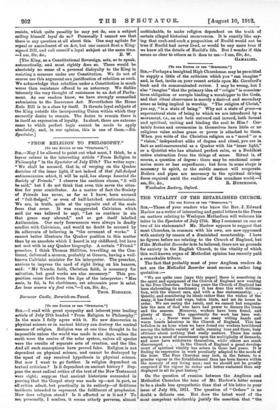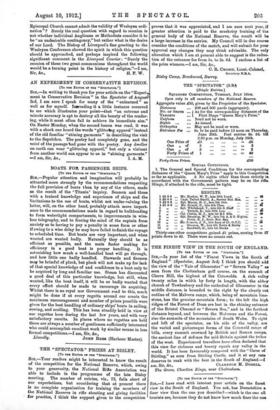THE VITALITY OF THE ESTABLISHED CHURCH.
[To THE EDITOR Or THE "SpacraTort.-1 SIR,—Those of your readers who know the Rev. J. Edward Harlow as a writer of interesting and genial letters to the Press on matters relating to Wesleyan Methodism will welcome his letter in the Spectator of July 27th. May I comment on one or two of his statements P Mr. Harlow appears to suggest that most Churches, in common with his own, are now oppressed with anxiety by reason of a diminished membership. I have no figures before me relating to the Church of England, but if the Methodist Recorder is to be believed, there are no grounds for anxiety in the English Church, to the vitality of which this well-known organ of Methodist opinion has recently paid a remarkable tribute.
The fact that probably most of your Anglican readers do not see the Methodist Recorder must excuse a rather long quotation :—
"We are quite sure [says this paper] there is something in the spirit and equipment of the Church of England now wanting in the Free Churches. For long years the Church of England has been elaborating its machinery ; it has done this with delibera- tion, with the utmost care, and with a fine statesmanship. . . . Quietly, and considering its ideals rather than the wishes of the many, it has found out ways, taken hints, and set its house in order. We are seeing the result, and we cannot but congratu- late the men of God who have had power to discern the times and the seasons. Moreover, workers have been found, and plenty of them. The opportunity for work has been wel- comed. . . . Never were there so many willing hands and warm hearts laborious in the Church of England. This has befallen in an hour when we have found our workers bewildered among the infinite variety of calls, running here and there, busy °Mimes about nothing that really matters. There has come among ns a mood of resentment upon the multiplicity of demands, and some have withdrawn themselves, while others are much discouraged. . . . In the Church of England a great develop- ment of spiritual vitality has arisen in these last years. It is finding its expression in work peculiarly adapted to the needs of the hour. The Free Churches may look, in the future, to a greater vigour in the Establishment than has been known within the memory of any living man ; and we should not be greatly surprised if the vigour be richer and better sustained than any displayed in all its past history."
On the question of reunion between the Anglican and Methodist Churches the tone of Mr. Harlow's letter seems to be a shade less sympathetic than that of his letter in your issue of July 8th, 1911. The question of " Orders " is no
doubt a delicate one. But does the latest word of the most competent scholarship justify the assertion that "the. Episcopal Church cannot admit the validity of Wesleyan ordi- nation" P Surely the real question with regard to reunion is not whether individual Anglicans or Methodists consider it to be "an undesirable contingency," but rather what is the desire of our Lord. The Bishop of Liverpool's fine greeting to the Wesleyan Conference showed the spirit in which this question should be approached, and perhaps inspired the following significant comment in the Liverpool Courier : "Surely the reunion of these two great communions throughout the world would be a turning point in the history of religion."—I am,



































 Previous page
Previous page